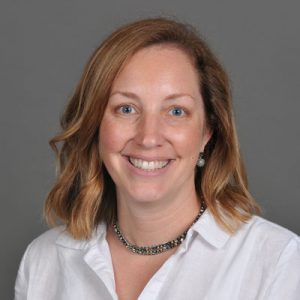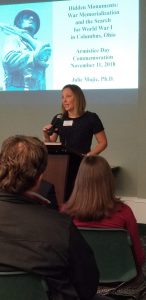Civil War Connections & Community Outreach

Graduate school for academic history is quite the silo. Unless you are entering a public history program, which I did not, the focus is truly on developing enough content knowledge to drive a publishing record and a subsequent career as an academic historian. There is (or at least was when I was there) little effort to develop teaching skills, connect history to ongoing conversations in the public discourse, or learn how to manage the administrative and service responsibilities that come with academic department membership. I worked within this silo, largely ignorant of these shortcomings, for several years until I made the decision to leave it. To be fair, the demands of the tenure track do not really allow for deeper engagement with what it means to be a historian. The academic history profession is now beginning to address many of these issues, thankfully.
Once away from academia however, it became clear to me that being a historian meant more than demonstrating how much I knew about the Civil War or seeking to fill in as many gaps in that knowledge as fast as possible. I joined the Board of Trustees of a local historical society and suddenly I was researching and designing exhibits, preparing public lectures on a range of historical topics, and writing about local history and politics for a variety of publications. I also formed a historical consulting firm and began a fascinating oral history project at a local school, among other endeavors. These ventures into public history – of seeing how I could connect my identity as a Civil War historian with the needs of a broader community – were a jolting separation from my prior path but also one that was increasingly rewarding.

Being a historian in public, rather than in academia, propels history into conversation with real life – with people who collect artifacts for a living, who work in museums, who feel history is important to their community’s heritage, who study historical events on their own time and on their own dime. I could see the opportunity to broaden my perspective when conversing with hobbyists who know the ins and outs of myriad artifact collections, their provenance, and their value. The scientist down the street with the full barn of thrift store finds? Yep, he is definitely a historian of sorts. The volunteer docent who has walked in costume as a reenactor for decades? Yep, she is definitely a historian of sorts. I may have read more books (and that’s debatable), learned methodology, theory, and argument from eminent scholars, and published with academic presses, but I have grown intellectually from interacting with people who conduct history in public, in addition to those on a campus. However, the gulf between people who consume and produce history as a passion and the people who consume and produce history as a trained career choice is enormous. It is a gulf that neither side really seems to want to cross, filled with distrust and disdain. In perpetuating it, we all lose.
One of the most rewarding aspects of this new public history hat I am wearing is that my audience is consistently attentive. They show up because they want to be there, eager to learn and to absorb what I am sharing. That’s not to say anything negative about college students – I love to teach that population – but there are no members of a public history audience who attend my lectures because it fits their schedule, they needed the credits, or their advisor told them to come. As such, I feel a connection with a public history audience in a different way, which of course has its ups and downs. Some people want to politicize my talk or lecture me on what I should believe, but mainly they are grateful, and I am consequently grateful for their expressions of appreciation.
Public history has also connected me more deeply with my community and my region. In working in this space, I have learned about organizations doing important work in my city. Historians in this sense are community partners and must seek to collaborate toward larger goals. “My city” encompasses the suburb in which I raise my family and the bustling, dynamic metropolis within which most of my public history work is done. As a historian, I have joined the Board at my local suburban library and built a network of professionals in various positions who call on me for consulting work. My professional network expands into the larger city and encompasses other public and academic historians who make their livelihoods from history in one way or another.
Building these networks has helped me to see the diverse ways that historians envision their careers and pursue their personal and professional relationships with history itself. I find their work compelling and I realize that they are doing the work of history rather than the thinking and writing about history. Again, graduate school did not teach me much about how historical knowledge and skills are applied in the real world. The demands of academia often make it impossible to think about how a National Register of Historic Places nomination form is researched and completed, how a museum exhibit goes from an idea to a reality, or how an organization must play a political game in order to secure city funding. Some academic historians within my network are generous with their time and knowledge and volunteer to connect with historical society members in a variety of settings. Others still seem much too busy to bother. I understand both perspectives now.
 I also feel more connected to the Midwest in general. I give public talks throughout a multi-state area (largely thanks to Emerging Civil War), I am in touch with professionals at regional museums and historical societies, and I have a pulse on what public history means to Midwesterners. It has allowed me to consider too how I would like to contribute to Midwestern history, either through publication or public history. I have considered my “midwesterness” in a new light since entering the public history realm. How does this region shape the story that I am telling? Am I telling a story that just happens to be set here or is the region a central character in that story? Academic historians in and of the Midwest are asking these questions now more than ever and it is an exciting time to participate in the telling of that story from multiple perspectives.
I also feel more connected to the Midwest in general. I give public talks throughout a multi-state area (largely thanks to Emerging Civil War), I am in touch with professionals at regional museums and historical societies, and I have a pulse on what public history means to Midwesterners. It has allowed me to consider too how I would like to contribute to Midwestern history, either through publication or public history. I have considered my “midwesterness” in a new light since entering the public history realm. How does this region shape the story that I am telling? Am I telling a story that just happens to be set here or is the region a central character in that story? Academic historians in and of the Midwest are asking these questions now more than ever and it is an exciting time to participate in the telling of that story from multiple perspectives.
It has been an important professional development for me to get to know the “history scene” in my community. It has helped me reimagine history as a calling and a career. I have not yet fully reconciled these two kinds of historians within me. I know that research is the core of my calling to this profession. I want to research and I want to write – I want to think deeply about historical events and people and have the opportunity to share ideas that might be meaningful or make a difference. What I’ve realized lately though is that I can do that in a wide variety of ways. Those ways might be tied specifically to the Civil War; they may not. Maybe I’m really a different kind of historian than how I was trained; maybe it is not really necessary to define it. My journey to find my voice may only just be beginning and that is truly exciting.

Well done. I really appreciate your column. Bridging the gap between academia and public history is a battle we will be fighting for a long time. I am right there beside you.
Thanks Derek!
What a wonderful essay- made my day to read a beautifully written paean to community, having found one, recognizing the fit, and feeling grateful.
Thank you David!
Wonderful piece, Julie. I like the sense of excitement and anticipation you discover as you realize the transformation you’ve undergone and now look at the road ahead. Thanks for sharing that sense of discovery.
I focused a good part of my PhD on the connection between nonfiction writers and place, so your questions really jumped out at me: “How does this region shape the story that I am telling? Am I telling a story that just happens to be set here or is the region a central character in that story?” It will be interesting to see how you ground yourself in these questions as you think about them more.
You wrote, “there are no members of a public history audience who attend my lectures because it fits their schedule, they needed the credits, or their advisor told them to come.” This made me chuckle. 🙂
I was fortunate to complete my grad work at Duquesne, which offered a public history certificate. I feel more graduate schools should follow this model.
Thanks for supporting me along this journey, Chris!